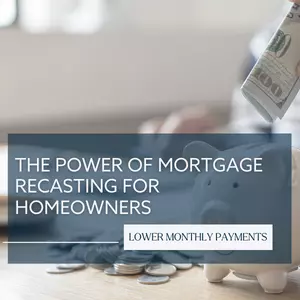

Leveraging Your Home Equity for a Smooth Home Sale
As a homeowner planning to sell your house, you've likely heard the term 'home equity.' But what exactly does it mean, and how can it be leveraged to facilitate a smooth home sale? This blog aims to demystify home equity and explore how it can be used in real estate transactions involving buyers and sellers. So, what is home equity? It refers to the percentage of your home that you actually own; it's the portion of your property that you've paid off. This value naturally increases as you pay down your mortgage over time. Essentially, it is the current market value of your home, minus what you still owe on your mortgage. Now, you might be wondering, "How much equity do I have?" To determine your home equity, you need to know the current market value of your home. Once you have that, subtract the amount you still owe on your mortgage. The resulting figure is your home equity. For example, if your home is worth $300,000, and you still owe $100,000 on your mortgage, your home equity is $200,000. So how can you leverage your home equity to facilitate a seamless home sale? One of the ways you can use equity is by offsetting affordability challenges. As a seller, you can use the proceeds from your home sale to pay off your existing mortgage. If there's enough equity, the remaining funds can be used as a down payment on your next home, effectively lowering your new mortgage payments. For buyers, on the other hand, a seller's home equity can impact negotiations and the sale price. A seller with high home equity has more leeway to negotiate on price as they stand to make substantial profits from the sale. Conversely, a seller with low equity may be less flexible on price as they need to cover the remaining mortgage. Moreover, home equity can be a safety net for sellers during fluctuating market conditions. If the market dips and house prices fall, sellers with substantial home equity are less likely to end up underwater (owing more on your mortgage than your home is worth). However, leveraging your home equity shouldn't be done haphazardly. It's crucial to consider several factors, such as the real estate market's current state, your financial situation, and your long-term goals. It's also essential to remember that while it can be an asset, home equity isn't guaranteed. Your home's value can decrease due to factors beyond your control, such as market downturns or changes in your neighborhood. In conclusion, home equity is a valuable tool that can be leveraged to navigate the often-complex world of real estate. Whether you're a buyer or a seller, understanding home equity and how it can be used to your advantage is key to a smooth home sale or purchase. However, as with any financial strategy, it's always wise to consult with a professional advisor to ensure you're making the best decisions for your situation.
Read More

7 Home Improvement Projects to Boost Your Property Value
Are you looking to increase the value of your home? Whether you're preparing to sell your home or just want to make some upgrades, there are a number of projects you can undertake that will boost your home's value. Here are seven projects you can consider that are sure to impress potential buyers and increase your home's value. Add a Centrally Located Half Bathroom Adding a half bathroom to your home can make a big difference in its value. Potential buyers will appreciate the convenience of having an extra bathroom in the home. A half bathroom located in a central location, such as near the living room, kitchen, or in the finished basement is a particularly good choice. You don't need a lot of space to add a half bathroom, either. A small closet or even a corner of a room can be converted into a bathroom with the right planning and design. Fresh Paint and Accent Walls Painting the interior of your home is a simple and cost-effective way to make it look fresh and new. Choose a neutral color scheme to appeal to a wide range of potential buyers, or consider adding an accent wall to make a statement. Accent walls can be painted in a bold color or even a wallpaper pattern to add interest and dimension to a room. Replace Hardware and Light Fixtures Old hardware and light fixtures can make a home look dated and unappealing. Upgrading to modern fixtures is a quick and easy way to give your home a new look. Choose fixtures that complement the style of your home, whether it's modern, traditional, or somewhere in between. Don't forget to replace outdated ceiling fans as well. New Kitchen Counters and Cabinets The kitchen is one of the most important rooms in the home when it comes to increasing value. Upgrading your kitchen with new counters and cabinets can make a big difference in how buyers perceive your home. Consider quartz or granite countertops for a sleek, modern look. Add new cabinets or upgrade existing ones with new hardware and finishes. Finish the Basement If you have an unfinished basement, finishing it can be a great way to add value to your home. A finished basement can serve as a family room, game room, or even an extra bedroom. Make sure to include plenty of lighting and consider adding a wet bar or small kitchenette for added convenience. New Bathroom Tile and Vanities The bathroom is another important room in the home. Upgrading your bathroom with new tile, vanities, and fixtures can make a big difference in how buyers perceive your home. Consider a new glass shower enclosure or a freestanding bathtub for added luxury. Add Functional Storage Finally, adding functional storage throughout your home can make it more appealing to potential buyers. Consider adding built-in shelving or custom closets to bedrooms and other living spaces. You can also add storage solutions in the garage, basement, and even outside with a shed or storage box. In conclusion, these seven projects are sure to increase your home's value and appeal to potential buyers. Whether you're preparing to sell your home or just want to make some upgrades, these projects are a great place to start. Remember to choose finishes and designs that complement the style of your home, and you're sure to see a return on your investment. We’re here to help and advise, if you aren't sure what projects will give youtube most bang for your buck we’d be happy to advise and even share our vendor list!
Read More

How To Appeal Your Philadelphia Property Taxes
4 MINUTE READ If you’ve received your Philadelphia property tax assessment and don’t agree with it, you may have recourse. The city has a step by step appeals process that you can follow to get your property tax assessment reconsidered. It can be a bit confusing but we’ve tried to distill it into something that’s easy to understand. The following article is not legal or tax advice and may not be up to date or apply to your unique situation. Consult with an attorney or qualified CPA for details about your unique property tax situation. The First Step is a “First Level Review” First, request a first level review (FLR) using the FLR form included in the assessment documents sent to you each year. You can get a replacement of this form if you misplaced it by calling 215-686-9200. With your FLR form, include any documentation or information that you believe helps your case in adjusting your property’s assessment. This includes photos, recent appraisals, and other documentation justifying why you think the assessment is incorrect Based on the FLR form and the submitted information, an Evaluator may decrease, increase (!), or make no change to your property’s assessed value. If you are not satisfied with the results of your FLR or choose to skip this step all together, you can file a formal appeal with the Board of Revision of Taxes (BRT) by the first Monday of October of each year (October 7th for 2019). Appeals should make the case for one or more of the following: The appraisal for your property is too high or too low The appraisal isn’t similar to similar properties in your area The characteristics of your property used in the appraisal are substantially incorrect I’m not satisfied with the FLR and I need to appeal. How do I do it? We’ve put together a comprehensive guide so you can make a strong appeal. Make sure to review the BRT appeals page for additional information. First, do you qualify to make the appeal? Determine your status as an “aggrieved party”. Only aggrieved parties can file Appeal Applications. Aggrieved parties are: The owner of record An equitable owner (not necessarily on the record) A tenant who pays all or part of the real estate taxes or the use and occupancy taxes A mortgagee in possession of the property BRT also specified who is an “authorized” applicant. An authorized applicant is either the aggrieved party, your legal counsel, or an authorized representative. If your lawyer or another representative is filing the appeal, a copy of the power of attorney form or a letter of representation should be included with the appeal application. Make Your Appeal: File your appeal by the first Monday of October of that year (October 7th for 2019) with the BRT by mail or in person. Additional information and exceptions are detailed on the appeals page of the OPA website. Get Your Hearing Date And Time: The BRT will send a notice of the date, time, and location of your appeal hearing once the application has been processed. If you choose not to have a hearing on your application, they will use the documentation in your application. Call In The Experts: You can line up “Expert Witnesses” if you think it would help your case. These are people who have specialized knowledge of something concerning your case, like a private home appraiser or real estate developer with knowledge of the value of your property. At least 20 days before your hearing, you have to provide the BRT with a summary of the expert’s qualifications, proof of their compliance with the Pennsylvania Real Estate Licensing Act, and twelve copies of a full narrative appraisal report prepared with the Uniform Standards of Professional Appraisal Practices (USPAP) containing the findings and conclusions of their testimony. Consult with a lawyer when determining the need for and requirements for including an expert witness in your appeal. Present Your Case: At your hearing, you will present all of the evidence that you think makes the case for a revision of your property’s proposed valuation. Any expert witnesses will also testify. The Board might ask for additional information before making a decision. Make sure that you review all of the rules and regulations surrounding the oral hearing procedure when preparing your case. Documents You Should Include in the Application or Produce at the Hearing: Photographs of the front, side, rear, and street views of the property Any appraisal documentation contradicting the City’s appraisal Comparative values of similar properties around your property if they contradict the City’s appraisal Expert witness documentation detailed on the BRT appeals page Anything else you or your lawyer think will help your case We highly recommend retaining legal counsel if you choose to undergo the formal appeals process. A skilled and trustworthy real estate lawyer will help you make the strongest case possible in accordance with all of the associated rules and regulations. However, lawyers can be costly and you are certainly able to appeal your property’s assessment without one. Related Article | 5 Things Every Philadelphia Homeowner Needs To Know About Property Taxes Related Article | Everything You Need To Know About The Philadelphia Tax Abatement Are you looking to buy or sell a home in Philadelphia? We’d love to help
Read More
Categories
Recent Posts











